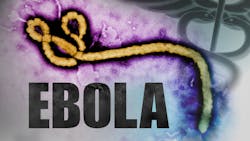CDC Offers Guidelines for First Responders Related to Ebola Calls
Ebola has been headline news for several months. Although the number of cases continues to rise, and we have had our first case in the US, the message has all been pretty clear. Health experts all over the United States are promising us that we do not need to be worried about Ebola. As a registered nurse and a first responder, I am not so convinced. It is time for ALL first responders to understand this disease, the signs and symptoms, prevention, and follow-through. Your best defense is pretty tactical. Be prepared mentally and physically, have the right equipment, be armed with knowledge and options, and go home safely every night and protect your loved ones.
On October 1, 2014 the CDC issued an “Interim Guidance for Emergency Medical Services (EMS) Systems and 9-1-1 Public Safety Answering Points (PSAPs) for Management of Patients with Known or Suspected Ebola Virus Disease in the United States”. The targeted audience includes law enforcement agencies and personnel.
This CDC guideline assists a PSAP (dispatcher) or a first responder in getting appropriate and adequate information when handling inquiries and responding to patients with suspected Ebola symptoms. The ultimate goal is worker safety.
Key Points for PSAPs
Remember that the likelihood of contracting Ebola is extremely low unless a person has direct unprotected contact with the blood or body fluids (saliva, mucus, vomit, feces, sweat, tears, breast milk, urine, and semen) of an infected person (alive or dead) or have touched someone’s eyes, nose, mouth or an open cut, wound, or abrasion.
When the potential risk of Ebola is elevated in your community, it is important for PSAPs to question callers about:
- Residence in, or travel to, a country where an Ebola outbreak is occurring. In Africa, confirmed cases of Ebola HF have been reported in: Sierra Leone, Liberia, Guinea
- Signs and symptoms of Ebola such as sudden chills, high fever (greater than 101.5 degrees Fahrenheit), vomiting, severe headache, diarrhea , join and muscle aches, weakness, stomach pain, loss of appetite, and unexplained bleeding. Symptoms may appear anywhere from 2 to 21 days after exposure to Ebola HF though 8-10 days is most common. People without symptoms are not contagious.
- Other risk factors, like having contact or caring for someone who is sick with Ebola.
- Direct handling of bats or nonhuman primates from disease-endemic areas.
Dispatchers need to share any positive information with and all first responder personnel who will be responding to the location. The correct personal protective equipment (PPE) should be donned prior to contact with the suspect. Additionally, EMS staff should be on hand to check for symptoms and risk factors for Ebola. First responders should notify the receiving healthcare facility in advance when they are bringing a patient with suspected Ebola, so that proper infection control precautions can be taken. Bear in mind that any other individuals on scene, and potentially all surfaces and property, could also be infected. Protecting yourself and others is your primary priority. If responding at an airport or other port of entry to the United States, the PSAP should notify the CDC Quarantine Station for the port of entry.
If a PSAP or EMS staff indentifies a citizen with suspected Ebola (s)he must inform first responders to take the following actions:
- Don appropriate PPE equipment.
o Gloves
o Gown (fluid resistant or impermeable)
o Eye protection (goggles or face shield that fully covers the front and sides of the face)
o Facemask to protect the nasal and oral cavities. Respiratory protection that is at least as protective as a NIOSH-certified fit-tested N95 filtering facepiece respirator or higher should be worn.
o Additional PPE might be required in certain situations (e.g., large amounts of blood and body fluids present in the environment), including but not limited to double gloving, disposable shoe covers, and leg coverings.
*** PPE should be planned for and acquired well before a pandemic or other outbreak occurs. Make sure your patrol car or work station is well stocked.
- Keep the subject separated from other persons as much as possible.
- Use caution when approaching a patient with Ebola. Illness can cause delirium, with erratic behavior that can place EMS personnel at risk of infection, e.g., flailing or staggering.
- Do not take anyone suspected to be infected to a detention center – they belong in an acute medical setting. The only thing scarier that a hospital overrun with contagious Ebola patients is a jail overrun with contagious Ebola criminals. Think about it.
Additional Risks for LEOs
The likelihood that you are going to come into contact with a positive Ebola subject anytime soon is remote. But remember, there is no vaccine to prevent contracting the disease. Officers frequently have contact with individuals who they know virtually nothing about. Are they feeling ill? Have they traveled to Africa recently? These are usually not the opening questions during a traffic stop, field interview or an investigation.
There are numerous contagious diseases out there that you don’t want to get. Ebola is just one of them; Hepatitis C, HIV, malaria, meningitis, mononucleosis, typhoid, West Nile fever, whooping cough and yellow fever are just a few of the other diseases you may want to actively try to avoid. This would be a good time to review basic health and safety protocols. A good review would be your training related to searching suspects.
- Be aware of any open cuts or abrasions on your skin
- Wear protective gloves if exposure to blood or body fluids is likely
- Never put your hands where your eyes can’t see
- Ask an arrestee if there are sharp objects on his/her person. If feasible ask them to empty their pockets and turn them inside out to expose the lining
- Use extreme caution when searching an arrestee’s clothing or possessions
Body Fluid Exposure: What to do
- If blood or a body fluid has splashed onto skin wash the skin with soap and water for 15 minutes.
- If blood or a body fluid has splashed into the eyes, nose, or mouth; rinse the eyes/mouth/nose with tap water for 15 minutes.
- If you have a laceration, clean the wound with soap and water first and then apply direct pressure to stop the bleeding if needed.
- If you were exposed to the blood or other body fluid of a patient during the course of your work, immediately seek medical attention and notify your superior.
- Make sure your vaccinations are up to date (According to WHO, there may be a vaccine for Ebola by the end of the year)
Scarier Than Ebola: Human Error
What went wrong in the Thomas Duncan Ebola case in Dallas
- A flaw in the electronic health records systems led to separate physician and nursing workflows, meaning the travel history documented in the nursing portion did not show up in the physician's workflow.
- The family, who the infected patient lived with, failed to comply with a request to stay home. A confinement order, signed by Dallas County Judge Clay Jenkins , included an armed guard. The order was deemed necessary to ensure the four residents of the home did not leave and that visitors could not enter.
- It took days for the Texas officials to persuade a HazMat crew to go into the apartment.
- A hazardous material crew did arrive to decontaminate the apartment but didn't have the required permits to clean and remove hazardous waste. Additionally, the family had to relocate before the cleanup can begin…and no one wanted to take them in.
These issues have all been addressed and remedied, but it does lead one to believe that as a community, let alone a country, that we are grossly unprepared for an Ebola epidemic.
Additionally, although the CDC and WHO admit not having the answers to all the questions about Ebola; many self proclaimed experts believe that they do. Misinformation is even more damaging than non –information. Ebola panic has already gripped the nation. When you talk to citizens about Ebola it is important to only give factual statements. Should there be an actual increase in the risk or the number of actual cases of Ebola, expect and prepare for the negative aspects of mob mentality.
I am not a prepper; but I am a realist. THINK BLEACH! Ebola can survive for several hours and the virus in body fluids (such as blood) can survive up to several days at room temperature. If there is one thing I believe people should load up on for that “just in case” scenario it would bleach. Bleach kills Ebola. The bleach solution must be at a concentration of at least 2.5%. 5 cups water to one cup bleach is ideal. This solution loses its effectiveness after 24 hours, so fresh solutions must be prepared every morning. It is used to clean up blood, vomit, stool, or urine. Soiled linens need to be placed in the solution for at least one hour. Never put bleach or bleach solution in the patient’s mouth or eyes. Bleach is also used to clean the room used by the patient. In Liberia, a gallon of bleach now costs as high as $25.00
I believe it would be grossly naïve to believe that we have had our only case of Ebola in the US. Stay knowledgeable, keep informed, and you will have a far better chance of remaining disease free. Everything you do to boost your immune system is just an extra bonus so get adequate rest, eat healthy foods in healthy amounts, exercise, and learn how to relax and laugh.
About the Author

Pamela Kulbarsh
Pamela Kulbarsh, RN, BSW has been a psychiatric nurse for over 25 years. She has worked with law enforcement in crisis intervention for the past ten years. She has worked in patrol with officers and deputies as a member of San Diego's Psychiatric Emergency Response Team (PERT) and at the Pima County Detention Center in Tucson. Pam has been a frequent guest speaker related to psychiatric emergencies and has published articles in both law enforcement and nursing magazines.
